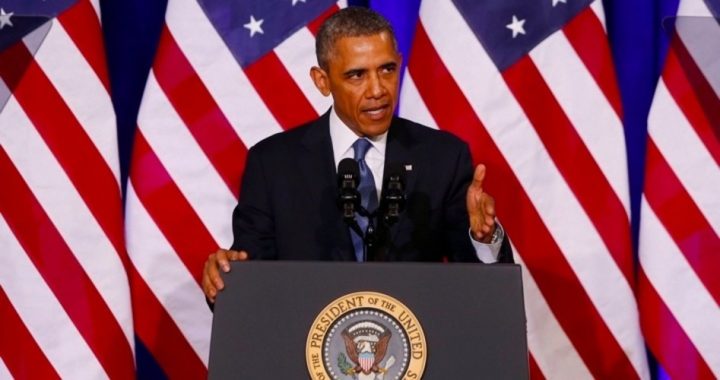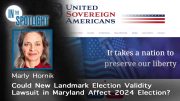
President Obama delivered a wordy and categorical defense of NSA warrantless snooping on Americans’ data privacy January 17 in a speech at the Justice Department, reiterating the longtime executive branch view that Americans have no reasonable expectation of privacy in any electronic transaction.
Though the NSA (and DEA) vacuums up every piece of Americans’ data — telephone records, Internet traffic, GPS locating points, and other data — without a warrant as required by the Fourth Amendment to the U.S. Constitution, Obama claimed that “the men and women of the intelligence community, including the NSA, consistently follow protocols designed to protect the privacy of ordinary people.”
The Fourth Amendment to the U.S. Constitution bans government searches without both a warrant from a judge and “probable cause” evidence. Warrants must also describe specifically what will be found in the search and where it will be found. The NSA searches satisfy none of these requirements. Obama managed to say some 5,488 words in the speech — which allegedly addressed privacy concerns — without even once mentioning the Fourth Amendment or “probable cause.” His speech twice mentioned warrants, but neither comment dealt with the current controversy over data vacuuming.
The president’s speech confirmed an August 9, 2013 “White Paper” on NSA surveillance, which stated that “participants in telephone calls lack a reasonable expectation of privacy for purposes of the Fourth Amendment in the telephone numbers used to make and receive their calls.”
Senator Rand Paul (R-Ky.), a persistent critic of warrantless wiretapping, tweeted that Obama’s promises of privacy without substance sounded a lot like the president’s promises with regard to ObamaCare. The Tea Party senator sarcastically added: “If you like your privacy, you can keep it.”
Obama’s speech was basically about damage control: What part of the NSA program will they be able to salvage from the inevitable congressional backlash in the wake of revelations by former NSA contractor Edward Snowden? Obama had a few words to say about Snowden, and in doing so reiterated the fundamental contradictory position of the executive branch with regard to Americans’ electronic data privacy:
Given the fact of an open investigation, I’m not going to dwell on Mr. Snowden’s actions or motivations. I will say that our nation’s defense depends in part on the fidelity of those entrusted with our nation’s secrets. If any individual who objects to government policy can take it in their own hands to publicly disclose classified information, then we will never be able to keep our people safe, or conduct foreign policy. Moreover, the sensational way in which these disclosures have come out has often shed more heat than light, while revealing methods to our adversaries that could impact our operations in ways that we may not fully understand for years to come.
Obama and other NSA apologists are essentially arguing the contradiction that the NSA collects only information for which the American people have no reasonable expectation of privacy, i.e., that nothing in Americans’ phone traffic or Internet habits is private. But if anyone — such as Edward Snowden — releases this public same information to Russia, or to the press, well, he is obviously a traitor who has released the deepest and most vital intelligence secrets of the U.S. government.
Interestingly enough, Obama hypocritically claimed in the same speech that if a private company — such as Comcast, Verizon, or AT&T — were to hold this information, then Americans’ privacy rights would be threatened. “On the other hand, any third party maintaining a single, consolidated data-base would be carrying out what is essentially a government function with more expense, more legal ambiguity, and a doubtful impact on public confidence that their privacy is being protected.”
Obama continually cited “safeguards” and “protections” he was creating in accessing the information (none of which is based upon actual constitutional restraints), but he has already expanded the use of the data to a wide range of criminal activity: “In terms of our bulk collection of signals intelligence, U.S. intelligence agencies will only use such data to meet specific security requirements: counter-intelligence; counter-terrorism; counter-proliferation; cyber-security; force protection for our troops and allies; and combating transnational crime, including sanctions evasion.” The term “transnational crime” includes any kind of drug transaction, and “cyber-security” means any kind of identity theft, computer hacking case, or misuse of electronics. In short, they are exceptions that devour the supposed rule.
President Obama continually stressed the claim that “They are not abusing authorities in order to listen to your private phone calls, or read your emails.” And no one has come publicly forward to claim that the NSA or DEA is listening to phone call content en masse — yet. But in the NSA pattern of lies, Obama may have been caught using a months-old fallback lie. The NSA has indeed been using warrantless wiretaps of phone call content within the United States, as revealed in the case of U.S. v. Muhtorov, in which a legal immigrant Uzbekistani refugee living in Colorado was accused in a terrorism case. Charlie Savage of the New York Times reported back on October 26 of last year that “The practice contradicted what [Solicitor General] Verrilli had told the Supreme Court last year in a case challenging the law, the FISA Amendments Act of 2008. Legalizing a form of the Bush administration’s program of warrantless surveillance, the law authorized the government to wiretap Americans’ e-mails and phone calls without an individual court order and on domestic soil so long as the surveillance is ‘targeted’ at a foreigner abroad.”
Photo of President Obama speaking about the NSA at the Department of Justice, Jan. 17, 2014: AP Images
Related Articles:
N.Y. Judge: NSA Spying “Imperils Civil Liberties of Every Citizen” but “Legal”



